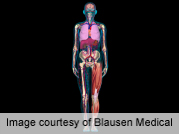
WEDNESDAY, June 6 (HealthDay News) — A previously unknown type of stem cell is the culprit behind blocked blood vessels that can lead to heart attack and stroke, new research in mice suggests.
It’s long been believed that smooth muscle cells within blood vessel walls combined with cholesterol and fat to clog arteries. But in research with mice, a team at the University of California, Berkeley found that’s not the case.
Using genetic tracing, the investigators determined that a type of stem cell called a multipotent vascular stem cell is to blame and said it should be the focus in the search for new treatments.
“For the first time, we are showing evidence that vascular diseases are actually a kind of stem cell disease,” principal investigator Song Li, a professor of bioengineering and a researcher at the Berkeley Stem Cell Center, said in a university news release. “This work should revolutionize therapies for vascular diseases because we now know that stem cells rather than smooth muscle cells are the correct therapeutic target.”
The study was published June 6 in the journal Nature Communications.
“This is groundbreaking and provocative work, as it challenges existing dogma,” said Dr. Deepak Srivastava, director of the Gladstone Institute of Cardiovascular Disease at UC San Francisco, who provided some of the mouse vascular tissues used in the study.
“Targeting the vascular stem cells rather than the existing smooth muscle in the vessel wall might be much more effective in treating vascular disease,” explained Srivastava in the news release.
While the findings hold promise, experts note that research involving animals frequently fails to lead to benefits for humans.
More information
The U.S. National Heart, Lung, and Blood Institute has more about atherosclerosis.

